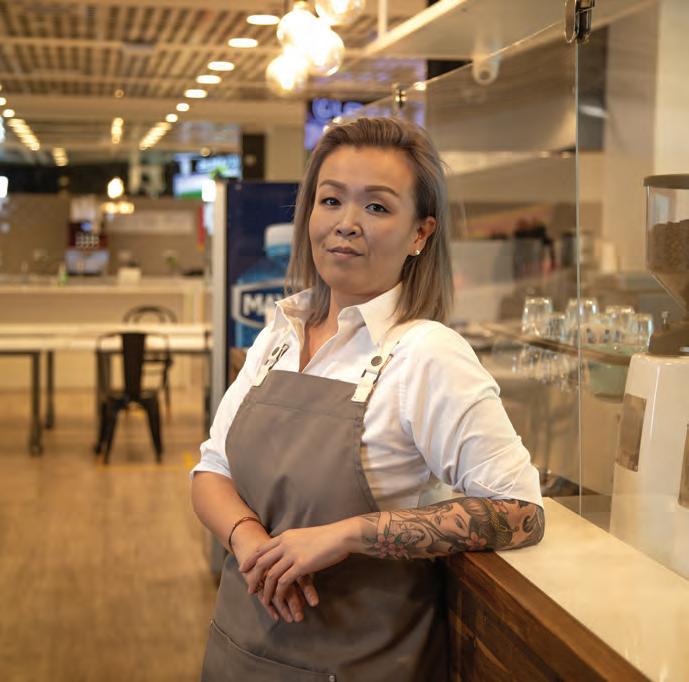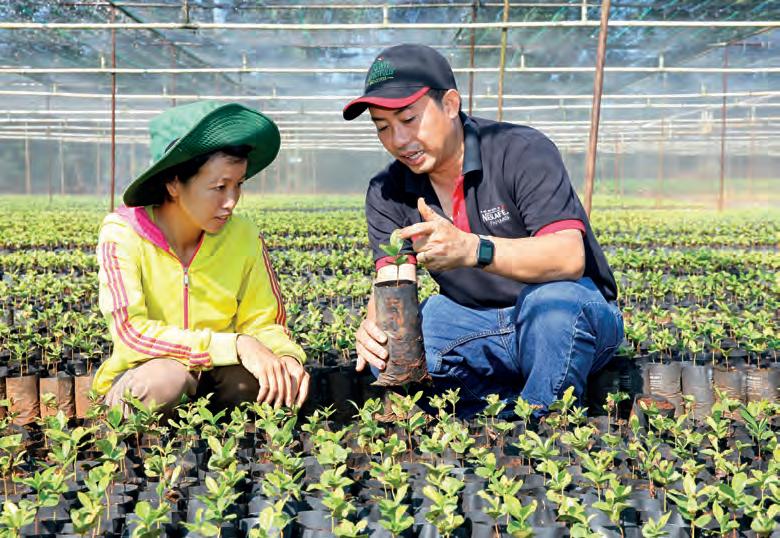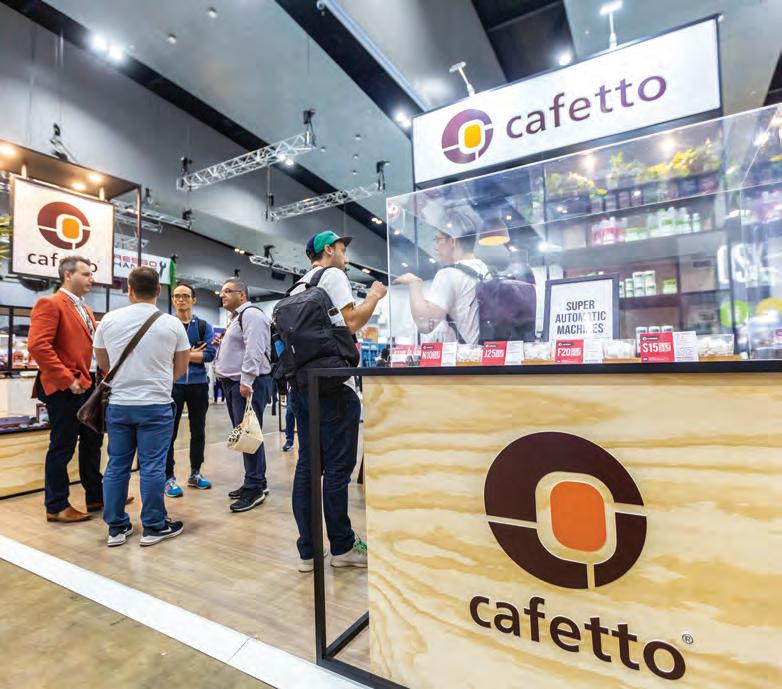
8 minute read
GOING PRO
Professionals in education
Joanna “Jo” Yuen, National Barista Trainer at Nestlé Professional talks about the company’s expanding virtual customer educational program and the importance of a hands-on touch.
According to the International Coffee Organization, world coffee consumption has grown from 120.4 million bags in 2006 to a staggering 167.26 million bags in 2021.
“Global consumption, however, isn’t the only thing that has changed in the coffee industry over the past 15 years,” says Joanna “Jo” Yuen, National Barista Trainer at Nestlé Professional.
“When I started as a barista 15 years ago, the attitude with coffee education was ‘just go with the flow and as long as the coffee looks okay, people can’t tell the difference’,” says Jo. “Some café operators actually believed coffee tasted 62 beanscenemag.com.au
Joanna “Jo” Yuen is the National Barista Trainer at Nestlé Professional.
better after being refrigerated.”
She says these days are long gone, with the average consumer more knowledgeable about coffee bean quality, flavour, and origin.
“Customers have higher expectations for their daily cup of coffee, which means that baristas have to constantly be refining their offerings and skills,” says Jo.
To aid this constant development is Nestlé Professional’s three-module coffee training course catering to basic to advanced barista skills.
“Each session covers both the conceptual and practical aspects of coffee. For example, we teach the complete bean to cup journey and key trends within the coffee landscape,” says Jo.
“In terms of practical coffee making skills, we look at how to deliver a consistently great cup of coffee through teaching extraction standards, different brewing methods, best milk texturing techniques, latte art, and more.”
The program includes a sensory training module, which focuses on how the post-harvest process develops and influences the end flavour of coffee, and how to identify some of its 850 aromatic flavours.
Attendees can come back, retake courses, or expand into new skill levels, with students earning a certificate upon completion of the three modules.
“We provide this to any of our customers who want to expand their skills as part of our drive to best support our customer’s businesses. Pre-COVID I even used to fly to our customers’ sites to deliver the training, as we believe customers learn best in their own environment,” says Jo.
“I love teaching coffee and being able to share my knowledge and passion with budding baristas. These people I’m training will be the next generation of coffee leaders and knowing that I helped by imparting some of my passion and skill to them is extremely rewarding.”
This training, along with additional webinars, is also provided to the Nestlé Professional in-house team, covering the key coffee bean brands, The Roaster Guy, Buondi, and Nescafé. This ensures every level of the organisation has a thorough understanding of its coffee products, source of origin and sustainability certification.
“Especially when New South Wales was in lockdown, I worked closely with the wider Nestlé Professional state beverage and commercial teams to ensure that they received the same education. This meant that they could then successfully deliver the training to our customers in non-lockdown states,” says Jo.
“From New Zealand to regional mining sites in Western Australia, we wanted to ensure our clients, which include accommodation, travel and leisure, bakeries, cafés, pubs and clubs, as well as businesses in the education sector, were all receiving the support and training they needed.”
With COVID-19 limiting in-person training, Jo says Nestlé Professional had to pivot its classes and communication methods to suit an online space.
“We offered virtual training sessions, and had a range of barista training videos, available to customers upon request, which are still easily accessible on our webpage, along with clientspecific materials which are tailored by our account managers,” says Jo.
To keep engagement high, Jo began every session with a quiz to boost her customers’ energy levels.
“Each session was based on interactive learning exercises to grow sensory skills using common items at home. The training session also included videos to make it as interactive as possible, especially during post-training in the Q&A session,” says Jo.
While COVID-19 has taught trainers how to be more tech savvy and adaptable to digital teaching, Jo says coffee still remains a practical skill.
“I believe our resources will continue to provide budding baristas with good foundational knowledge before practical training, however, training will always need the professional in-person touch,” says Jo. “I’m so excited to teach all our customers in a hands-on learning environment again.”
For Jo, using her bubbly personality to make each class personal and engaging is another way Nestlé Professional distinguishes its training classes.
“We really drive customer engagement and product inspiration in our classes. We don’t just want to teach, we want to inspire creativity and help our customers with recipe development,” says Jo. “With more than 150 years of experience in food and beverages, we are constantly exploring and pushing the boundaries of what is possible.”
With summer now upon us, Jo says it’s the perfect time for customers to expand their cold beverage offerings, with a chilled and refreshing alternative to hot coffee. The unique Nescafé Nitro Cold brew system — which dispenses a shot of nitrogen at the flick of a switch — provides an option to serve both nitro and pure cold brew from one machine.
To meet customer demand for new and classic drink’s flavours, Jo says that Nestlé Professional has recently launched Milo, in a shelf-stable liquid concentrate format, as part of its commercial cold dispenser CoolPro. Milo joins a range of other popular flavours such as Nestea lemon, Sjora, and Nescafé Ice, all available at the touch of a button.
“Our extensive range of beverage services cater for all customer needs, from our fully automated push button self-serve machine, to bean to cup solutions and the growing demand for cold beverages,” says Jo.
“Once we have supplied customers with these beverage solutions, our next job is always to educate and direct them how to best use them.”
Embedded in Nestlé Professional’s coffee training program is the importance of sustainable and ethical sourcing of coffee beans, including information on Nestlé’s dedicated originproducing regions.
This ties in with Nestle’s overarching plan to support growing communities by supporting its farmers to produce sustainable crops and improve product traceability for the consumer.
Already, Nestlé Professional’s whole roasted bean range is sourced from Rainforest Alliance beans and is roasted locally in Gympie, Queensland. Its Nescafé Blend 43 coffee is also 100 per cent sustainably sourced under 4C certification.
Nestlé Professional’s sustainability focus it part of a wider Nestlé Net Zero Roadmap, which aims to halve Nestle’s net greenhouse gas emissions by 2030 and achieve net-zero carbon emissions by 2050.
“We have created a three-stage plan which will see us first accelerate our sustainable sourcing, manufacturing and packaging efforts, propelling more of our brands to become carbon neutral by 2025. Our next step will involve us globally investing in new technologies and making fundamental changes to our products and businesses by 2030. We’re also taking steps to achieve a regenerative food system at scale with advanced agricultural techniques,” says Scott Stuckmann, General Manager, Nestlé Professional Oceania.
As part of Nestlé’s Net Zero Roadmap, by 2025 the company has committed to sustainably source all its coffee and cocoa, redesign its packaging to reduce virgin plastic globally by one third and source 100 per cent renewable electricity at all sites, globally.
“More than 60 per cent of the energy used by our Gympie factory comes from renewable sources, including used coffee grounds. This kind of circular innovation is a great example of sustainability in action,” says Scott.
Nestlé Professional is focused on achieving the milestones set out in its roadmap and continuing to educate and support its customers on sustainability initiatives.
“I think if we all do our part, we can achieve real change both within our business and our supply chain. We can also help educate and inspire our customers to embrace a more sustainable way of doing business,” says Jo.

For more information, visit www.nestleprofessional.com.au
Breaking borders

With border restrictions finally easing, MICE2022 will fill the Australian and international coffee industry’s desire to meet face to face again.
It’s been almost three years since the entire Australian coffee industry last gathered under the one roof at the Melbourne International Coffee Expo in (MICE) 2019.
Since early 2020, the national community has been kept apart by tight border restrictions to prevent the spread of COVID-19. However, they’ve also limited people’s ability to connect and do business in person.
“State borders are finally easing after two years, and MICE2022 will be our chance to come together as an Australian coffee industry,” says MICE2022 Show Director Lauren Winterbottom.
“The past couple of years have been really tough for hospitality, with restrictions and uncertainty coming and going, and MICE is here to support those businesses to get back to it, make big sales, and network.”
Western and South Australia in particular have been shut off from the east coast. Josephine McKay-Engdahl, Director of the WA-based Moccamaster Australia, says the easing of border restrictions will make it easier to meet with customers they have not seen for a long time.
“There will be more of a sense of connection – nothing takes the place of meeting and communicating with people in person,” she says.
“It will be really good to be in Melbourne and it will be great to be involved at MICE2022 to showcase our products and to connect with our customers and friends in the coffee industry.”
At the event, taking place from 27 to 30 September, Moccamaster will use the opportunity to see old and new customers, showcase different models and some new Moccamaster products, and further spread the word about Moccamaster and filter coffee.
“For the wider industry it will be a forum for renewed connections, much needed confidence and the reality that there will be new ways of doing business post-COVID,” Josephine says.
“The event greatly contributes to the community aspect of the industry as it is nationally recognised where a large majority of players in the coffee industry meet – this adds to the community vibe.”
MICE2022 will also play host to the 2022 World Barista Championship (WBC) and World Brewers Cup, drawing an additional layer of international attention.
For the past two years, Australians have not only been shut off to each other, but to the rest of the world. For the SA-based Cafetto, reopened borders will mean a chance to reconnect across the globe.
“[Travel restrictions have] created











